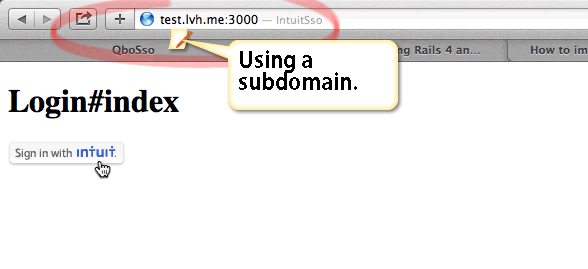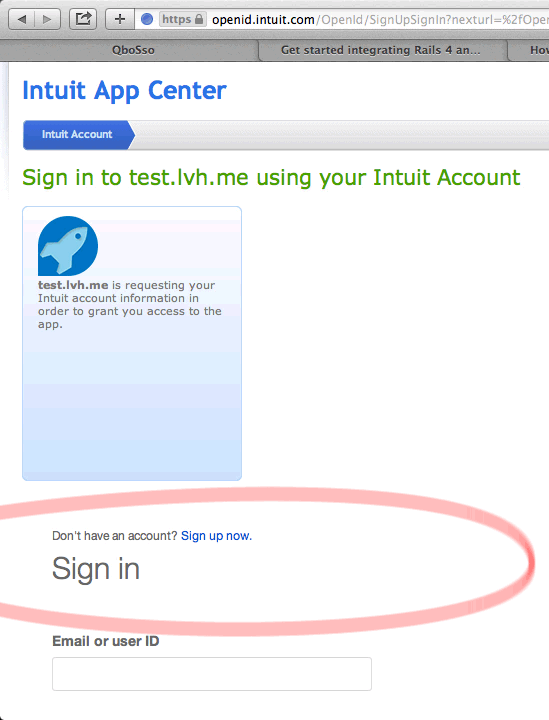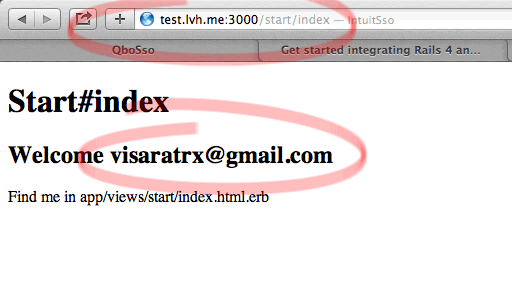Bare-bones QuickBooks Single Sign On with Rails
Fundamental Rails/QuickBooks Single Sign On (SSO)
In my previous tutorial I went over implementing SSO with Rails and Devise. This tutorial will focus on a basic implementation featuring just Rails (4.1.6) with subdomains
- Fire up a new rails app
- Add these to the Gemfile next
- The
config/initializers/omniauth.rbshould look like this. - While in the initializers edit the
config/initializers/cookies_serializer.rb - Make a Login controller with 2 actions,
indexandcallback. - In
app/views/login/index.html.erbput the Intuit SSO button. - Add these routes.
- Before we start working on the callback let's make a user.
- The
app/models/user.rbshould look like this: - Now we can implement the callback action within
app/controllers/login_controller.rbas so: - You may have noticed a redirect to a non-existent route and controller,
start_index_url, so let's implement that now. - In conjunction, let's fill in the route, controller, and view for this start redirect.
- Now we are ready to test.
$ rails new intuit_sso -T $ cd intuit_sso
gem "omniauth", ">= 1.0.3" gem 'omniauth-openid'
bundle install
Rails.application.config.middleware.use OmniAuth::Builder do provider :open_id, :name => 'intuit', :identifier => 'https://openid.intuit.com/openid/xrds' end
Rails.application.config.action_dispatch.cookies_serializer = :marshal
It seems one of the core underlying gems, ruby-openid, is not playing nicely with the Rails 4.1 default of
Rails.application.config.action_dispatch.cookies_serializer = :json
$ bin/rails g controller Login index callback
<h1>Login#index</h1> <ipp:login href="/auth/intuit" type="horizontal"></ipp:login> <script type="text/javascript" src="https://appcenter.intuit.com/Content/IA/intuit.ipp.anywhere.js"></script>
match '/auth/:provider/callback' => 'login#callback', via: [:get, :post]
root 'login#index', :constraints => { :subdomain => /.+/ }
Just a reminder: Make sure you add both :get and :post for the callback.
$ bin/rails g model User email password
class User < ActiveRecord::Base
def self.find_for_open_id(access_token)
data = access_token.info
if user = User.where(:email => data["email"]).first
user
else
User.create!(email: data["email"], password: generate_token)
end
end
def self.generate_token
Digest::SHA1.hexdigest("#{Rails.application.config.secret_token}#{Time.now.to_i}")
end
end
class LoginController < ApplicationController
skip_before_filter :verify_authenticity_token, :only => [:callback]
def index
end
def callback
if user = User.find_for_open_id(request.env["omniauth.auth"])
session[:user_id] = user.id
redirect_to start_index_url
else
redirect_to root_url, notice: 'Auth fail'
end
end
end
If you like to spin your wheels a bit and waste an hour or so go ahead and NOT skip the verify_authenticity_token.
$ bin/rails g controller Start index
# config/routes.rb
get 'start/index', :constraints => { :subdomain => /.+/ }
# app/controllers/start_controller.rb
class StartController < ApplicationController
def index
@current_user = User.find(session[:user_id])
end
end
<h1>Start#index</h1>
<h2><%= "Welcome #{@current_user.email}" %></h2>
<p>Find me in app/views/start/index.html.erb</p>
$ bin/rails s

lvh.me:3000 and click "Sign in with Intuit".

That concludes the tutorial for Bare-bones QuickBooks Single Sign On with Rails
Be sure to check out the screencast for more commentary as well as the code. For feedback use the comments area below rather than my email. If the question is broader than this tutorial use the Intuit Developer Forums, in which I regularly hang out.
- Pushed on 10/27/2014 by Christian
- QuickBooks Integration Consulting
